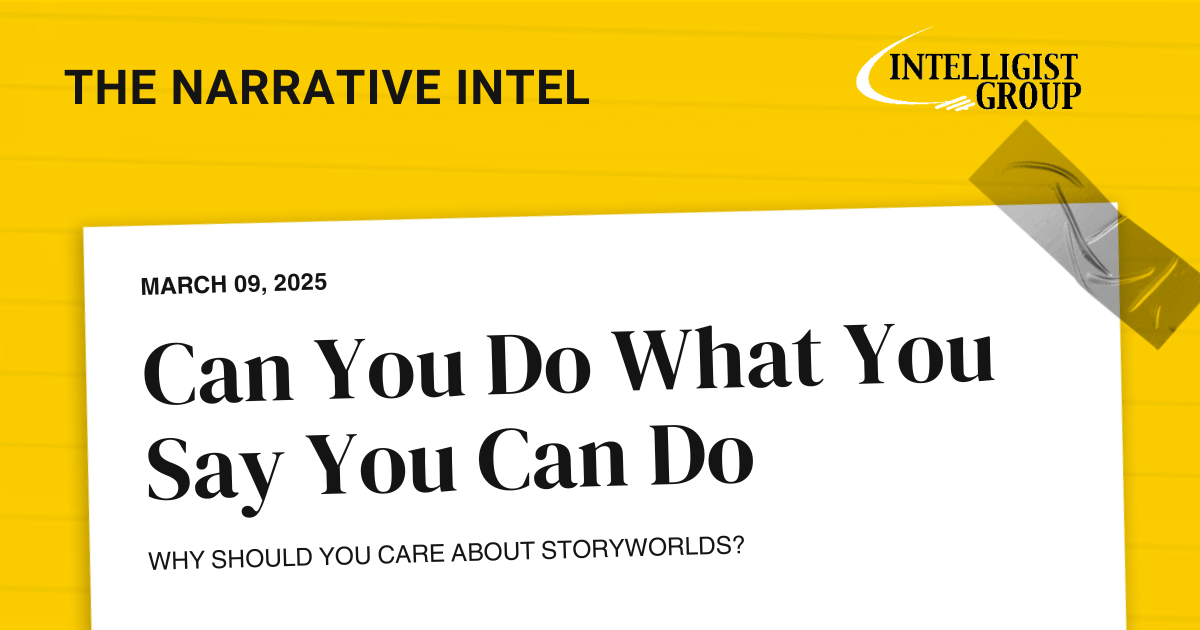- The Narrative Intel
- Posts
- Can You Do What You Say You Can Do
Can You Do What You Say You Can Do
Why should you care about storyworlds?

I've been talking about storyworlds and corporate narratives for over 2 decades and it comes up in almost every conversation I have with business leaders for pretty much every aspect of their business. Why should you care about storyworlds?
Stories have always been a powerful means to convey information. It's a framework we implicitly understand and with which we easily connect. We tell stories all the time. It could be how we met a friend or partner, a highlight from a work experience, or an amazing trip we took. From the stories, your audience learns more about you. If I listen to enough of these stories, I can learn a LOT about you.
Why is your storyworld important? One big reason is that's how I can vet you."
Building out a storyworld is complex. Still, some aspects are fairly accessible. I mentioned vetting a bit in Issue 2 of The Narrative Intel and explored it more a while back in a lead up to my TEDx talk in a post I called That Third Kind of Vet.
The flip side of learning how to vet is making it easy for others to vet you. A good starting point for your storyworld is making yourself vettable. You need to think like a showrunner or producer when building your storyworld. And yes, you DO have a storyworld. It may not be well constructed or fully fleshed out, but it's there. That could be your challenge OR your opportunity.
Years ago, I did a lot of consulting with people on personal branding. I’m not a fan of the term, but at the same time it's descriptive. The way I would describe personal branding is if I Googled you, would there be enough evidence to prove you’re as good as you claim?
That could be something simple, like keeping an updated LinkedIn profile. A little more active like posting and commenting on LinkedIn. Or stepping out of the walled garden of LinkedIn to create content on other platforms, or even your own channels.
That's part of your storyworld.
The first thing I do when I'm trying to vet a prospect or just get a feel for someone is to Google them or look them up on LinkedIn. I learn a lot. I can see if they are connected to someone I know. I get a sense of their expertise by what they post or comment on. And even a sense of them as a person if they choose to expose some of that in how they post.
Your job in creating content on LinkedIn or in your marketing presentation or in your investor deck is to give people a quick entry into your storyworld. To be really effective, you need to make yourself vettable when they dig in further. The more friction they have in the process, the less likely they are to pay attention until the end of the story, let alone take some action as a result of it.
The same holds for business. I look into the leaders of your company, your website, and what they write about and share with their audience and network. What am I looking for? I'm looking for evidence that you can do what you say you can do. That is what will drive my decision to work with you.
What you have done. What you can do. That is all part of your storyworld. I need that to vet you. So do your prospects and potential employers.
We all want to vet you to see if you can do what you say you can do. A well-crafted storyworld will ensure we do that well.
Berkson's Bits:
There are some terms I often use when I talk to business leaders, especially startups. If you are a startup I've advised or a leader I've coached, you've probably heard me talk about this one already, what I call the Howling Dog Problem. It goes like this:
Two people are sitting on a porch.
First person: Why's your dog howling?
Second person: He's sitting on a nail.
First person: Why doesn't he get up?
Second person: It doesn't hurt THAT much.
The message here is that not all problems are created equal. People don't pay to solve Howling Dog Problems.
Just because someone is complaining about something doesn't necessarily mean it's a problem they are willing to put money and effort into solving. If you don't identify that early on in your interactions with prospects, customers, or even internally in your organization, you will be wasting a lot of time with efforts that will fizzle out or end abruptly.
What I’m watching
If you want to get a sense of what it's like when Jeff Gomez and I have had conversations over the last 4 decades, this is kind of a "greatest hits" reel. If you are in the entertainment business, this will make a lot of sense off the bat. If you are in marketing and storytelling for business, these concepts are highly relevant, and many of them will be covered in our soon-to-be-released book The 10 Commandments of Successful Corporate Narratives.
CK Lin does an outstanding job in contextualizing this for his audience and asking some great questions: 193 Jeff Gomez: The Secret Code Behind Iconic Stories We Love
One last thing…
This clip from a movie with two guys trying to vet each other before a big mission came to mind as I was writing this. Guess which movie and let me know before you click!
Looking forward to continuing the conversation...
Alan
Reply